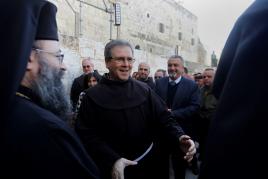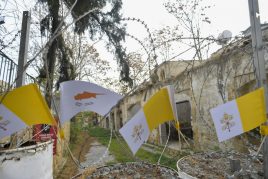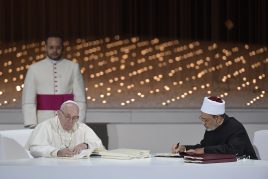
The Custody in Florence – Father Francesco Patton, Custos of the Holy Land, will be among the participants in the meeting “Mediterranean, Frontier of Peace”, to be held in Florence from February 23 to 27.
 He will be representing all the communities of the Franciscan friars located in the Mediterranean region – Israel, Palestine, Lebanon, Syria, Egypt, Cyprus and Rhodes, Greece, Spain and Italy.
He will be representing all the communities of the Franciscan friars located in the Mediterranean region – Israel, Palestine, Lebanon, Syria, Egypt, Cyprus and Rhodes, Greece, Spain and Italy.
“We feel that we belong to all the different shores of this Sea – the Custos told SIR – and we strongly believe that barriers caused by borders that have been turned into checkpoints must be removed. Borders and frontiers can be either porous or they can be obstacles that prevent the circulation of cultures, peoples, faiths and goods. As Custody, living in such a complex setting and in countries that are not always on friendly terms, we strongly believe in the need to reach beyond borders.”
 Initiating a process. This concern has seen the friars of the Custody at the forefront in assisting countless migrants crossing the Mediterranean in search of a future, far from poverty and war. Rhodes and Cyprus are recognised as two oases of hospitality run by the Custody. Cyprus, the Custos points out, “is the island with the highest number refugees and migrants compared to its population. When the Pope visited Cyprus last December and met with the refugees in our church in Nicosia, he was shocked to see that the church and convent were enclosed by barbed wire. That is an example of what I was saying before: borders that become checkpoints. It so happens that, for whoever is involved in trade, borders are always porous, but they are a barrier for persons in search of a future and human dignity.
Initiating a process. This concern has seen the friars of the Custody at the forefront in assisting countless migrants crossing the Mediterranean in search of a future, far from poverty and war. Rhodes and Cyprus are recognised as two oases of hospitality run by the Custody. Cyprus, the Custos points out, “is the island with the highest number refugees and migrants compared to its population. When the Pope visited Cyprus last December and met with the refugees in our church in Nicosia, he was shocked to see that the church and convent were enclosed by barbed wire. That is an example of what I was saying before: borders that become checkpoints. It so happens that, for whoever is involved in trade, borders are always porous, but they are a barrier for persons in search of a future and human dignity.
“Let us not turn borders into checkpoints.”
Thus Florence will offer an important platform for dialogue and mutual understanding, as was the case for the first meeting in Bari in February 2020, when the epidemic was already spreading. “In addition to the religious dimension, also the civil dimension of society will be present in Florence – Father Patton pointed out – with the mayors of the largest Mediterranean cities attending the event. This will provide further impetus for dialogue and understanding, as these meetings can influence public opinion.” The Custos’ hope coincides with La Pira’s dream, which inspired the Mediterranean Colloquies: “Seeing the world come together from occasionally hostile positions.” “Bishops, and especially mayors from different countries and faiths, will attend the event”, he added. “I trust in encounter and dialogue. I have no particular expectations for grand messages or final declarations. The value of this meeting consists in initiating a process which – as Pope Francis has said many times – is far more important than a joint declaration of intent. Instead, gathering together can have a huge impact on our societies.” With an additional practical implication: “The bishops and mayors arriving in Florence – notes the Custos – will have the opportunity to personally experience what it means to travel to Italy and return to their countries through privileged ‘corridors’. These experiences make us understand what it means to travel in challenging circumstances”.
Civitas. The issue of citizenship is among the major themes on the agenda of the meeting in Florence: “It is a core issue, although by no means a novelty, because it has existed for centuries,” Patton explained. “We find it in the Bible and epitomised in civitas Jerusalem, representing both a utopian dream and the hope that the earthly Jerusalem will be inspired by the heavenly one. Jerusalem is a city with 12 gates permanently open, the city of the 144,000, with people from all tribes, languages, races, and nations. It is a civitas that embraces the whole of humanity. It is the dream of all humanity. Citizenship expresses the dream of belonging to a civitas – a harmonious, beautiful, stable and serene reality of human coexistence blessed by the light of God.”
“The City of God is not about what comes next – points out the Custos of the Holy Land – but about how we interpret our way of living in the city today. If we live in the city with certain values then the human city is civitas Dei. Conversely, the city turns into a human-sized hell.”
 “Let us remember that the Abu Dhabi document reaffirms, among other things, that minorities must have the full right not only to exist but to have a voice, to be heard, to contribute responsibly to the human development of the country where they belong.”
“Let us remember that the Abu Dhabi document reaffirms, among other things, that minorities must have the full right not only to exist but to have a voice, to be heard, to contribute responsibly to the human development of the country where they belong.”
The proposal. “I firmly believe that initiatives such as those of Bari and Florence should not be restricted to Italy. Rather, they should bring the bishops of Europe to the heart of the Mediterranean. I think that Cyprus could be a suitable candidate for hosting the next meeting. Cyprus is an island that is both Europe and Middle East, a place that encompasses all the possibilities and the contradictions of this area. And it is no coincidence that the Pope has chosen to visit this island.











